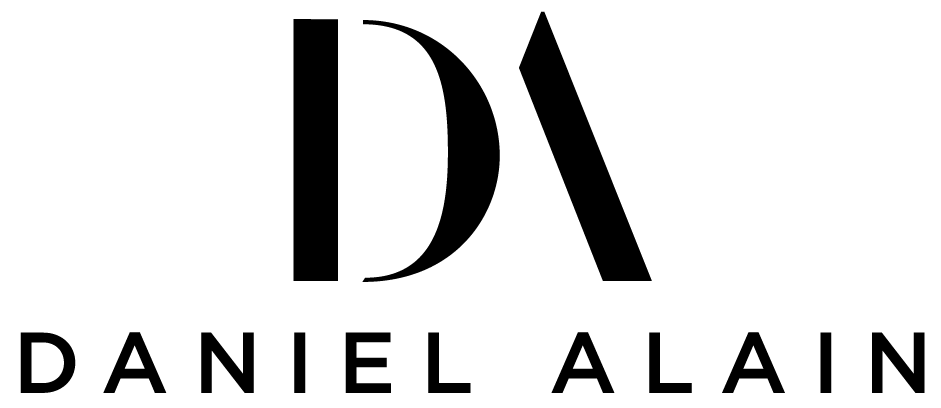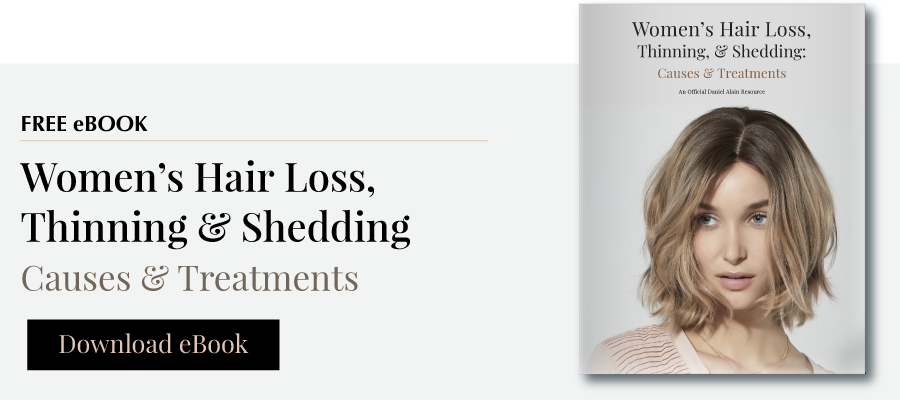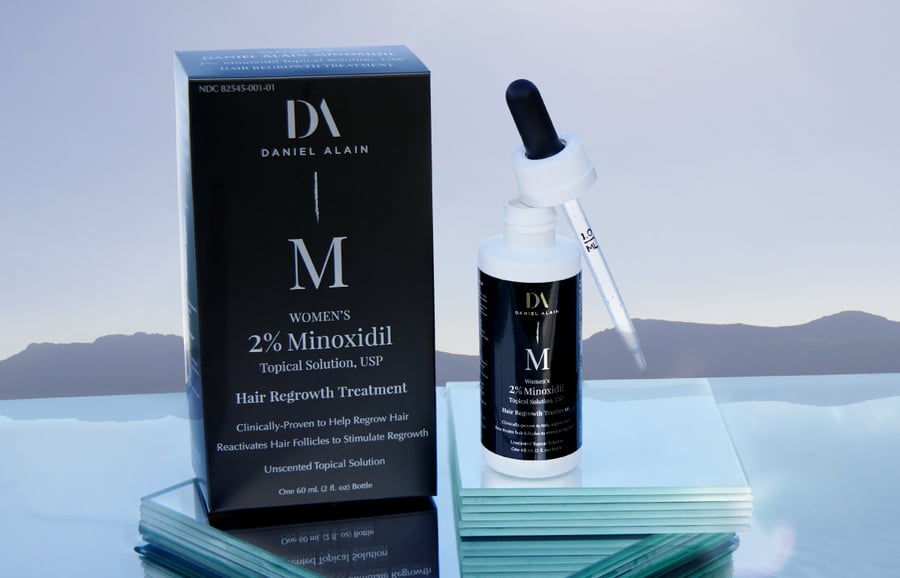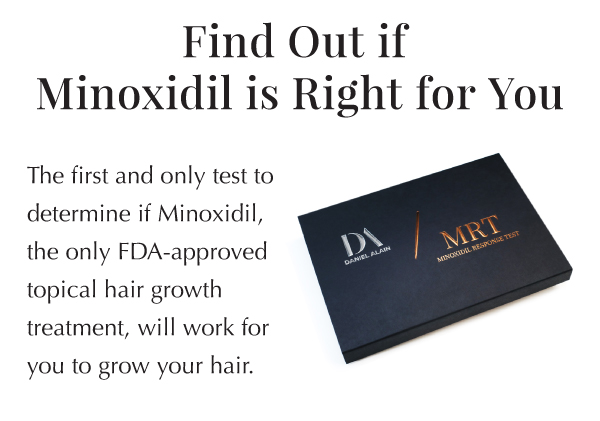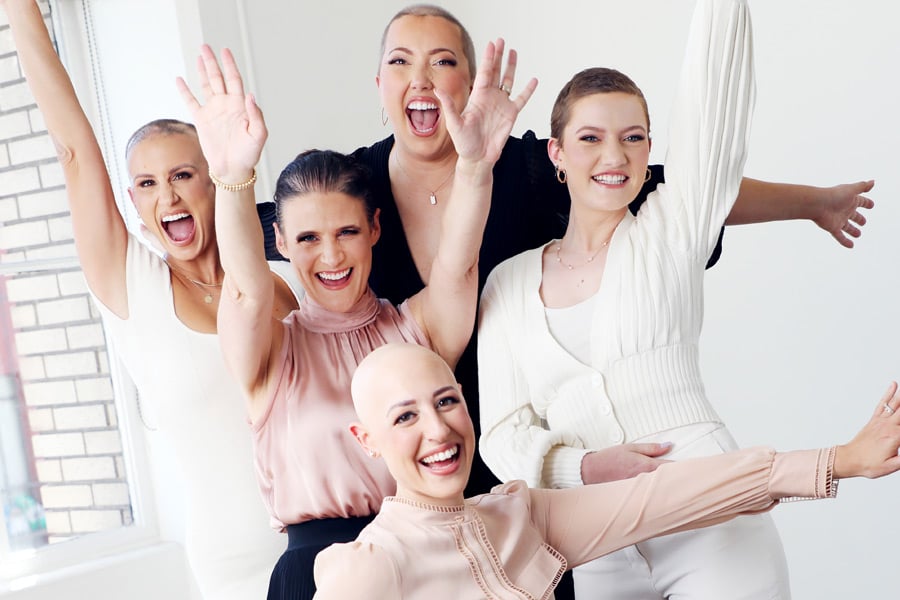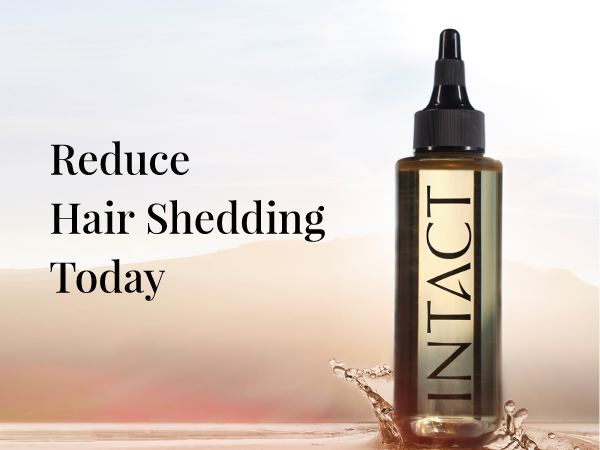Can Too Many Vitamins Cause Hair Loss?

Vitamins are an essential ingredient to healthy hair growth—but you can have too much of a good thing.
Can excess vitamins cause hair loss? The answer is a resounding yes. Taking too much of certain (but not all) vitamins can lead to a toxic buildup in the body, impairing your natural hormone balance and potentially leading to hair loss.
Now, this isn't because the vitamins themselves are toxic. If your body doesn't need extra vitamins—because you're already getting enough from food and natural sources—then the excess is stored in fat and tissue, leading to a buildup over time. While many supplements are touted as the holy grail of hair health, unless you're naturally deficient in these vitamins, then taking too much of them can do more harm than good.
So, which vitamins should you watch out for? In this article, we will discuss the vitamins that can lead to toxic buildup, as well as other preventative measures you can take if you're already seeing signs of hair loss.
VITAMINS THAT MAY CAUSE HAIR LOSS WHEN CONSUMED IN EXCESS
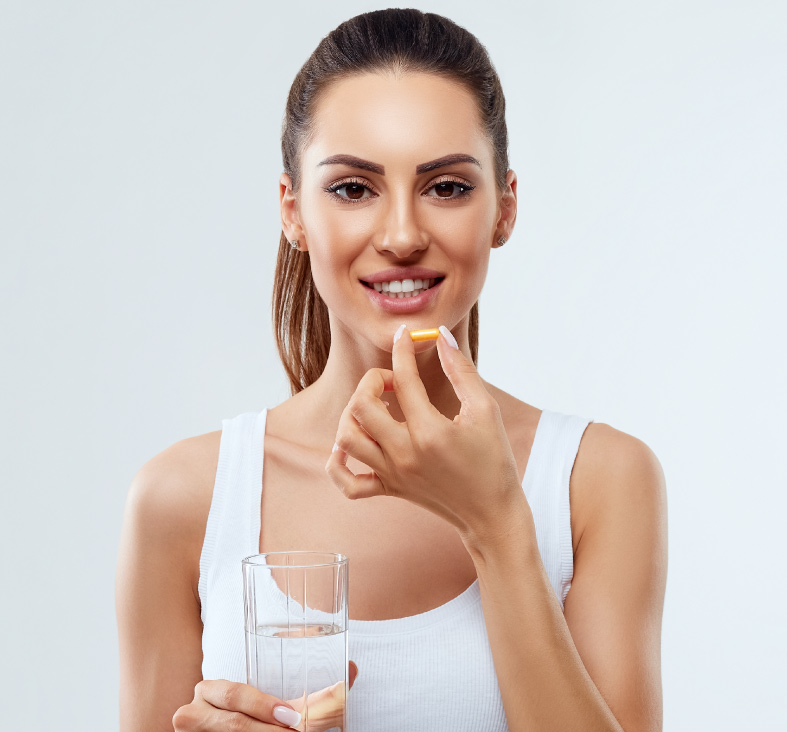
Does taking too many vitamins cause hair loss? Not always, but it definitely can.
Supplements and vitamins are marketed to make you believe that you need them for optimal health. However, the truth is that if you're eating a balanced diet and getting enough from natural sources like food, then taking an extra dose likely won't do much good in terms of hair growth.
On the flip side, over-supplementing—which happens when you regularly go over a vitamin's recommended dosage—can actually cause the very thing you're trying to remedy. Below are the most common culprits that have been linked to hair loss when taken in excess.
Selenium
Selenium is an essential mineral that serves many functions in the body, including acting as a catalyst for thyroid hormone production and metabolism. Taking 55 mcg a day is fine for most healthy adults, but taking more than that can lead to a toxic buildup. Too much selenium can lead to hair loss along with other serious symptoms like "blistering skin lesions, gastrointestinal symptoms, and memory difficulties."
Deficiencies in this mineral are not common and usually only happen if someone is living in an area with low levels of selenium in the soil, like China, Siberia, or Tibet. So, unless you have been diagnosed with a selenium deficiency or live in one of those places, it's best to stay away from selenium supplements until talking to your doctor.
Overdoing it can lead to a toxic buildup of pantothenic acid, which can cause gastrointestinal issues like bloating and diarrhea. While there are no studies linking B5 toxicity to hair loss, many people report hair shedding due to taking too much of this vitamin.
Zinc
Zinc is vital for healthy hair. This trace mineral helps repair damaged follicles and boost collagen production, which can help promote new strands. Most adults need 8-11 mg of zinc a day, and regularly taking anything over that can be toxic.
Too much zinc manifests into flu-like symptoms, such as fatigue, nausea, and vomiting, as well as hair shedding. Zinc toxicity is rare, but it can happen if you're taking too many supplements without consulting your doctor first.
Vitamin E
Vitamin E is a powerful antioxidant and has been linked to improved heart health, clearer skin—and some seriously silky strands. About 1,000 mg a day is all you need for optimum health, and taking too much of the vitamin can have adverse effects on the body.
Too much Vitamin E in your bloodstream can cause excessive bleeding due to its ability to reduce clotting factors in the body. When there's an increase in bleeding, there's always a risk of developing iron-deficiency anemia. This is closely linked to hair loss, as iron helps the body produce healthy red blood cells that are essential for hair growth.
Vitamin B5 (Pantothenic Acid)
Vitamin B5 is an essential vitamin that keeps your hair strong and healthy by helping your body produce fatty acids, which are the building blocks of proteins. You don't need much B5 for the body to function properly. In fact, 5 mg a day is all adults need for healthy hair growth.
WHAT YOU CAN DO TO CONTROL HAIR LOSS
Vitamins and supplements are not the only method of defense (or prevention) in the fight against hair loss. While they can be a great addition to your existing hair care routine, there are other things you can do to control hair loss and promote healthy growth.
Use INTACT Anti-Hair Shedding Treatment

INTACT is an all-natural anti-hair shedding treatment that helps reduce the amount of hair you lose daily without damaging your existing tresses. It fortifies weak, brittle strands by gripping each one at the root so they don't fall out during high-shed activities like brushing, washing, and styling.
INTACT is clinically proven to reduce hair shedding by up to 77% by stimulating the tiny muscles that surround each hair follicle (called the arrector pili muscle) so that they contract and hold onto each strand more effectively. The best part? You'll notice less hair in your drain and on your brush after just one use. Click here to learn more about INTACT.
Regrow Your Hair with Minoxidil
Despite what all the products lining your pharmacy's haircare shelf may say, Minoxidil is the only clinically proven, FDA-approved drug that can help regrow hair. This topical treatment helps dilate the blood vessels in your scalp to absorb more oxygen, in turn stimulating dormant follicles that have stopped producing hair due to age or genetics.
Although Minoxidil doesn't work for everyone, it can be a great way for those suffering from hair loss to regrow healthier, thicker strands. It can take three to six months to see any visible results, but if you stick with it and use it consistently, you may be able to restore some of the hair you've lost. But keep in mind it won’t work for everyone.
Why You Should Take a Minoxidil Response Test First

While it's tempting to dive head-first into trying out every hair loss remedy available, you don't want to waste money or time on treatments that just don't work. That's why we recommend anyone considering Minoxidil to first take our Minoxidil Response Test.
Daniel Alain's research team discovered the answer to why some people respond to Minoxidil while others don't: SULT1A1 enzyme activity. SULT1A1 enzymes are responsible for converting Minoxidil into its active form—a necessary step in stimulating hair growth. People with low enzyme levels are unlikely to respond to Minoxidil.
Our Minoxidil Response Test can help you determine whether or not your body has the necessary levels of SULT1A1 enzymes for it to be effective. This way, you can make an informed decision about how to best spend your time and money in order to get the healthier, thicker hair you want. Click here to learn more.
Wear a Human Hair Wig or Topper

Wearing a human hair wig or topper can be an effective way to cover up thinning or receding areas while you work on restoring your natural mane. These luxury pieces can simultaneously boost your confidence while protecting the scalp from further damage and preventing breakage due to daily wear and tear.
At Daniel Alain, we offer the world’s highest-quality human hair wigs and toppers so you can look your best while regaining your confidence. Plus, our products are designed with the most premium human hair to feel so natural—you won't even know you're wearing them! Click here to shop now.
FIGHT HAIR LOSS THE RIGHT WAY AT DANIEL ALAIN
If you're spending your free time Googling "can too many vitamins cause hair loss," it's time to stop the guessing game and start fighting hair loss the right way. Vitamins and other supplements can be beneficial for maintaining healthy strands, but they likely won't cure hair loss all on their own. And in some cases, taking too many vitamins can make it worse.
At Daniel Alain, we offer more effective, clinically proven and FDA-approved treatments that can actually restore your hair. Our INTACT Anti Hair Shedding Treatment can reduce shedding by up to 77%, and our Minoxidil Response Test can help optimize your results with any products you use in the future. Plus, we offer a wide range of human hair wigs and toppers for those who want an instant solution while they work on regrowing their hair.
Don't let hair loss get the best of you. Take control and join Daniel Alain's mission to fight hair loss today.
Click here to schedule a free consultation with one of our hair loss experts. We'll help you explore the best options for your hair loss journey.
book a free consultation
Our stylists will help you find the right hair loss solution just for you.

MORE WAYS TO COMBAT HAIR LOSS
Knowledge is power when it comes to fighting hair loss. That's why at Daniel Alain, we aim to provide as much information and resources as we can to help you take back control of your hair. Learn more about how taking too many vitamins can cause hair loss in your FAQs below, or browse our hair loss Learning Center for even more tips and tricks to ensure healthy, thicker strands.
- View our hair loss videos here.
- See what real customers are saying about Daniel Alain’s hair loss products.
- Join the conversation and learn how we’re changing the narrative on hair loss.
Frequently Asked Questions
Why Am I Suddenly Losing So Much Hair?
Stress, genetics, aging, overuse of styling tools, inadequate nutrition, and even taking too many vitamins can all contribute to sudden hair loss. If you're worried about your thinning or receding hair, consult with your doctor. They can help you determine the exact cause and provide the best treatment plan.
What is the Difference Between Hair Loss, Shedding & Thinning?
Shedding is a natural part of the hair growth cycle. We all shed between 50 and 100 strands of hair per day. Hair loss is caused by an interruption in the natural cycle, such as when the body stops producing new hair follicles or when the follicles become dormant. Hair Thinning occurs when the individual strands become weaker and more sparse.
Can Too Much Vitamin B Cause Hair Loss?
No—there is no clinical evidence to suggest that too much vitamin B can cause hair loss.
Can Too Much Vitamin A Cause Hair Loss?
Yes—consuming too much vitamin A can lead to hair loss. However, the reason why is still unknown.
Can Too Much Vitamin E Cause Hair Loss?
Too much vitamin E can cause excessive bleeding, which can lead to an iron deficiency. Iron deficiency can cause hair loss.
Can Too Much Vitamin D Cause Hair Loss?
Yes—while vitamin D has been shown to help hair loss in those who are deficient in the nutrient, it can also cause hair loss if you take too much.
Does Excess Zinc Cause Hair Loss?
Yes—excess zinc can interfere with copper absorption, which can lead to hair loss.
Does Too Much Biotin Cause Hair Loss?
No—there is no scientific evidence that biotin can cause hair loss.
Can Magnesium Make Your Hair Fall Out?
No—magnesium helps to keep your hair healthy and does not cause hair loss.
Does Calcium Cause Hair Loss?
No—calcium has actually been found to help with hair loss prevention.
What Vitamin Am I Deficient in if My Hair is Falling Out?
Deficiencies in vitamin B12, folate, biotin, and riboflavin are the only vitamins proven to contribute to hair loss. However, people sometimes experience hair loss or thinning when they're deficient in Vitamin D, iron, zinc, selenium, or vitamin E.
Is Hair Loss Due to Vitamin Deficiencies Reversible?
Yes—hair loss due to vitamin deficiencies is usually temporary and totally reversible. Once you start giving your body the nutrients it needs, your hair should start to regrow.
What is the Best Supplement to Strengthen Hair?
The best supplement to strengthen your hair is the supplement that has nutrients you are actually deficient in. That's why it's crucial to take a blood test before beginning any supplement routine. That way, you can be sure to target the exact vitamins and minerals that your body needs.
Which Food is Good for Hair Thickness?
High protein foods like eggs, salmon, and yogurt, can help promote hair thickness. Additionally, foods containing fatty acids (like avocados and nuts) can help provide your scalp with essential nutrients.
Is There a Way to Immediately Stop Hair Shedding?
Yes—INTACT Anti Hair Shedding Treatment is a revolutionary, clinically proven formula that helps stop hair shedding after just one use. Just apply it to your scalp and let it sit for 30 minutes. It helps reduce hair shedding by up to 77% after just one use.
Does INTACT Actually Work?
Yes—by stimulating the tiny muscles that surround each hair follicle, INTACT helps to make existing hairs stronger so they can withstand high-shed activities like brushing, washing, and styling. You'll notice an immediate reduction in hair shedding after your first use, and continued usage can help your hair become stronger and more resilient.
